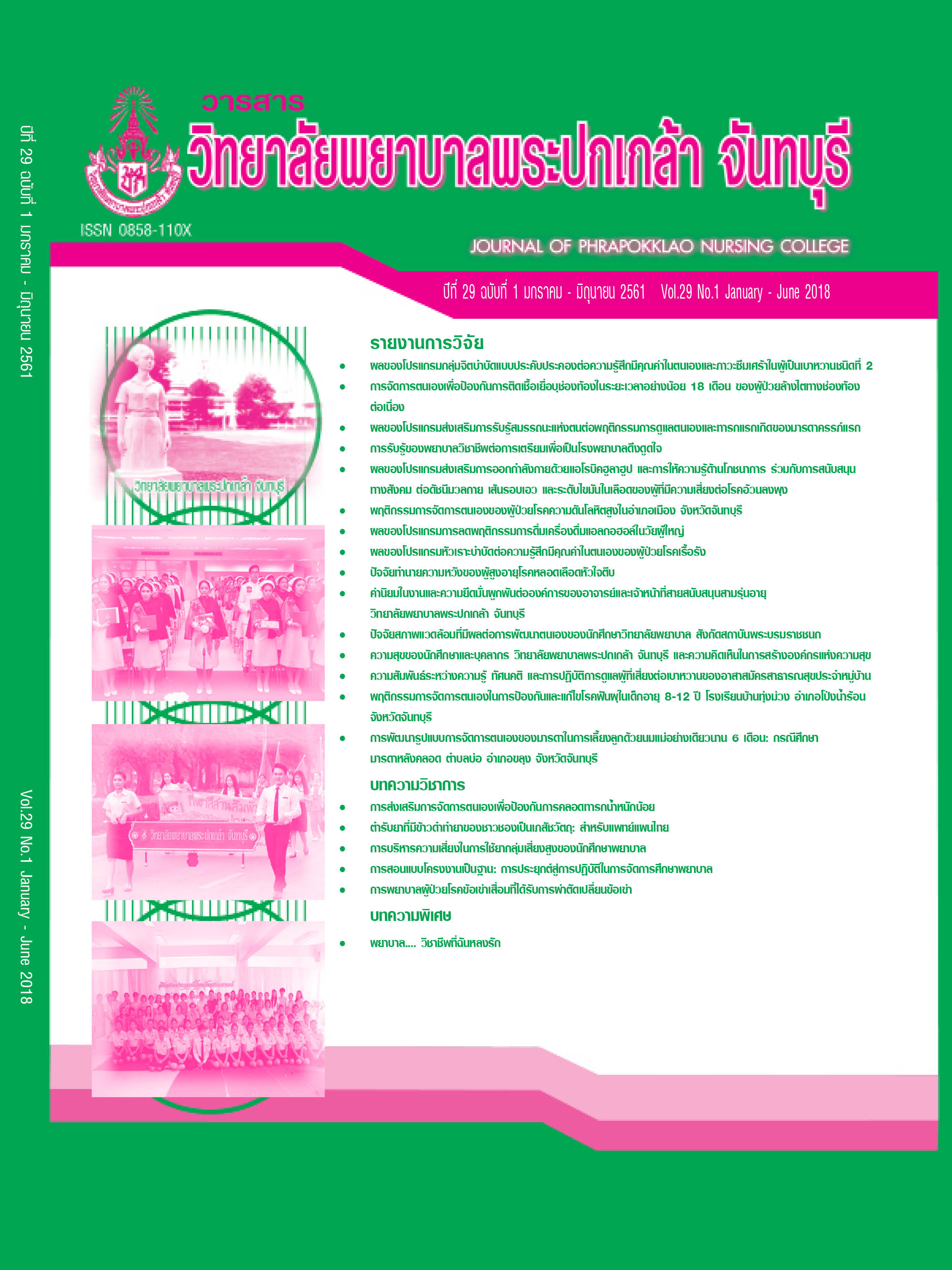Model Developing of Mother’s Self-management Regarding Exclusive Breastfeeding for 6 Months: A Case Study at Bo Sub-district, Khlung District, Chanthaburi Province
Keywords:
Exclusive breastfeeding for 6 months, Self-management model, Postpartum mothersAbstract
This research and development aimed to develop and evaluate the effectiveness of the mother’s self-management model regarding exclusive breastfeeding for 6 months. The participants were 13 postpartum mothers at Bo Sub-district, Khlung District, Chanthaburi Province. The research instrument was the interview guide of mothers’ perception regarding exclusive breastfeeding for 6 months with the reliability of .72. The research process consisted of five steps including: 1) the exploration of the existing model regarding exclusive breastfeeding for 6 months; 2) the development temporary model of sustaining exclusive breastfeeding for 6 months; 3) the trying and evaluating the developed model; 4) the model adjustment; and 5) the evaluation of finalmodel. Data were analyzed using frequency, percentage, mean, standard deviation, and content analysis.
The research results revealed that the model in this research was a collaborative among research team, postpartum mothers and family. The research team supported the postpartum mothers and family self-management including: 1) collaborative goal setting; 2) goals reviewing; 3) home visiting and giving advise following the need of postpartum mothers and family; 4) monitoring and evaluating the problems and giving incentives; 5) creating the helping channel when they experienced problems; 6) the providing the preceptors who have successful experiences; 7) encouraging family participation; 8) supporting the breastfeeding group. The postpartum mothers’ self-management consisted of: 1) goal setting of exclusive breastfeeding; 2) going on breastfeeding; 3) seeking information; 4) evaluating the problems and consulting the nurses; 5) searching for the best solutions when encountering obstacles; 6) changing the methods when the problem is still not resolved; and 7) intention for successful exclusive breastfeeding. The family roles were supporting and helping postpartum mother in breastfeeding. Results showed the successful sustaining breastfeeding for 6 months at 62% and the perceptions of self-management regarding exclusive breastfeeding for 6 months were at good level (X = 4.01, SD = .26).
This research suggested that the relevant personnel should adopt this model in support of breastfeeding at the health promoting hospitals and add the reinforcement methods for helping postpartum mother and family to solve the problems that would increase the successful of sustaining exclusive breastfeeding for 6 months.
References
กรรณิการ์ วิจิตรสุคนธ์, พรรณรัตน์ แสงเพิ่ม, นันทิยา วัฒายุ, สุพินดา เรืองจิรัษเฐียร, และสุดาภรณ์ พยัคฆเรือง. (บ.ก.). (2555). การเลี้ยงลูกด้วยนมแม่ (พิมพ์ครั้งที่ 2). กรุงเทพฯ: พรี-วัน.
นิศาชล เศรษฐไกรกุล, และคณะ. (2559). สถานการณ์การเลี้ยงลูกด้วยนมแม่ของผู้รับบริการในสถานพยาบาลรัฐ. วารสารวิชาการสาธารณสุข, 25(4), 657-663.
ปฐมพร โพธิ์ถาวร, อำไพอร เพ็ญสุวรรณ, และนิตยา ศรีญาณลักษณ์. (2556). การเลี้ยงบุตรด้วยนมมารดาของหญิงตั้งครรภ์วัยรุ่นในเขตเทศบาลนครสงขลา. วารสารพยาบาลกระทรวงสาธารณสุข, 23(3),45-52.
เปรมฤดี ศรีวิชัย, และพรนภา สุริยะไชย. (2558). ความสำเร็จในการเลี้ยงบุตรด้วยนมมารดาอย่างเดียวในมารดาวัยรุ่น 6 เดือนแรกหลังคลอด ที่โรงพยาบาลพะเยา. วารสารวิทยาลัยพยาบาลพระปกเกล้า จันทบุรี, 26(1), 17-24.
พัชนียา เชียงตา, ฉวี เบาทรวง, และกรรณิการ์ กันธะรักษา. (2557). ผลของการสนับสนุนทางสังคมต่อความสำเร็จในการเลี้ยงบุตรด้วยนมมารดาอย่างเดียวของมารดาครรภ์แรก. พยาบาลสาร, 41(3), 1-12.
พัชรินทร์ เงินทอง, กรรณิการ์ กันธะรักษา, และนงลักษณ์ เฉลิมสุข. (2558). การให้ความรู้ต่อการเลี้ยงบุตรด้วยนมมารดาในมารดาวัยรุ่น: การทบทวนอย่างเป็นระบบ. พยาบาลสาร, 42(พิเศษ), 57-68.
ภาวิน พัวพรพงษ์, คมกฤช เอี่ยมจิรกุล, ศิรินุช ชมโท, และอรพร ดำรงวงศ์ศิริ. (2559). เวชปฏิบัติการเลี้ยงลูกด้วยนมแม่. กรุงเทพฯ: บียอนด์ เอ็นเทอร์ไพรซ์.
สุนทร ยนต์ตระกูล, สุวิมล พุทธบุตร, รัตติยา ทองสมบูรณ์, อุมาภรณ์ กั้วสิทธิ์, และศุภวดี แถวเพีย. (2556). การพัฒนารูปแบบการส่งเสริมการเลี้ยงลูกด้วยนมแม่โดยการบูรณาการแบบมีส่วนร่วมในชุมชนเครือข่ายโรงพยาบาลมหาสารคาม. วารสารวิชาการสาธารณสุข, 22(6), 988-996.
อารีรัตน์ วิเชียรประภา, ขนิษฐา เมฆกมล, กรรณิการ์ แซ่ตั๊ง, เกษณี พรหมอินทร์, และสมลักษณ์ ศรีวิรัญ. (2560). รูปแบบการจัดการตนเองของมารดาในการเลี้ยงลูกด้วยนมแม่อย่างเดียวนาน 6 เดือน: กรณีศึกษามารดาหลังคลอด ตำบลบ่อ อำเภอขลุง จังหวัดจันทบุรี. วารสารวิทยาลัยพยาบาลพระปกเกล้า จันทบุรี, 28(2), 29-41.
Bernardo, L. H., & Casar, G. V. (2013). Long-term effects of breastfeeding: A systematic review. Retrieved April 1, 2018, from http://apps.who.int/iris/bitstream/handle/ 10665/79198/9789241505307_eng.pdf;jsessionid=E00C170182FB8F6DCC3D4D2AC289DAA4?sequence=1.
Creer, L. T. (2000). Self-management of chronic illness. In Boekaerts, M., Pintrich, P. R., & Zeidner, M. (Eds.). Handbook of self-regulation. pp. 601-629. San Diego, CA: Academic Press.
Cunningham, F. G., Leveno, K. J., Bloom, S. L., Hauth, J. C., Rouse, D. J., & Spong, C. Y. (2010). William obstetrics (23th ed.). New York: McGraw-Hill.
Global breastfeeding scorecard. (2017). Tracking progress for breastfeeding policies and programmes. Retrieved April 1, 2018, from http://www.who.int/nutrition/publications/infantfeeding/global-bf-scorecard-2017.pdf.
World Health Organization. (2010). Breastfeeding key to saving children’s lives: Ten steps to successful breastfeeding highlighted during world breastfeeding week. Geneva: Author.
World Health Organization. (2017). Infant and young child feeding: Fact sheet updated July 2017. Retrieved August 1, 2017, from http://www.who.int/mediacentre/factsheets/fs342/en/http://www.who.int/%20mediacentre/%20factsheets/fs342/en/
Downloads
Published
How to Cite
Issue
Section
License
Copyright (c) 2018 Journal of Phrapokklao Nursing College

This work is licensed under a Creative Commons Attribution-NonCommercial-NoDerivatives 4.0 International License.
เนื้อความ ข้อมูล และรายการอ้างอิงที่ผู้เขียนใช้ในการเขียนบทความเพื่อลงตีพิมพ์ในวารสารวิทยาลัยพยาบาลพระปกเกล้า จันทบุรี ถือเป็นความคิดเห็นและความรับผิดชอบของผู้เขียน คณะผู้จัดทำวารสารไม่จำเป็นต้องเห็นพ้องด้วยหรือร่วมรับผิดชอบ
บทความที่ได้รับการลงตีพิมพ์ในวารสารวิทยาลัยพยาบาลพระปกเกล้า จันทบุรี ถือเป็นลิขสิทธิ์ของวารสารวิทยาลัยพยาบาลพระปกเกล้า จันทบุรี หากหน่วยงานหรือบุคคลใดต้องการนำส่วนหนึ่งหรือทั้งหมดของบทความไปเผยแพร่ต่อเพื่อวัตถุประสงค์ใด ๆ จะต้องได้รับอนุญาตจากบรรณาธิการวารสารก่อน



